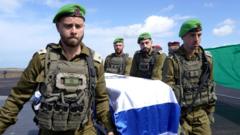Following the return of a body claimed to be that of Shiri Bibas, the Israeli military confirmed it was not her, creating further complications in the ceasefire agreement. As accusations and investigations unfold, both Israel and Hamas grapple with the implications for future hostage negotiations.
Body Mix-Up Complicates Already Fragile Ceasefire Between Israel and Hamas

Body Mix-Up Complicates Already Fragile Ceasefire Between Israel and Hamas
The Israeli military reports a mix-up regarding the remains of Shiri Bibas, worsening tensions amid ongoing ceasefire negotiations with Hamas.
Israel has stated that a body returned from Gaza on Thursday, claimed to belong to Shiri Bibas by Hamas, is not hers, further complicating the delicate ceasefire negotiations. Initially believed to include the remains of Shiri, a mother taken hostage along with her children during the attacks by Hamas on October 7, 2023, the Israeli military has confirmed only the identities of her sons, Ariel and Kfir, aged five and two, respectively.
Israeli Prime Minister Benjamin Netanyahu accused Hamas of mislabeling the body, suggesting that a Gazan woman's remains were given instead. Hamas spokesperson Ismail al-Thawabta responded by asserting it was a case of mistaken identity due to numerous bodies buried in debris following Israeli airstrikes. The group has initiated an investigation into the incident and called for the return of the mistakenly delivered remains.
The Bibas family was part of the 251 individuals taken hostage in the initial Hamas attacks. Shiri’s husband, Yarden, was released earlier this month. Following these unfulfilled exchanges, Netanyahu warned that Hamas would suffer consequences for failing to return Shiri's body, labeling the situation as a severe breach of their agreement.
As the ongoing military campaign continues to claim Palestinian lives—reportedly over 48,297 since the onset—Israeli officials are under increasing pressure from the public and political sphere to take decisive actions against Hamas. Notably, Netanyahu's claims regarding the deaths of Ariel and Kfir being at the hands of Hamas are expected to intensify sentiments for a renewed military response.
With the ceasefire entering a precarious phase, negotiations for the next steps remain uncertain. The second phase of the hostage return, which includes all remaining captives—alive or deceased—poses a more challenging scenario for both parties. Israel demands Hamas's full disarmament, while Hamas rejects continued Israeli oversight of Gaza.
Public opinion in Israel appears to favor prioritizing the return of all hostages, despite the rising tensions. President Isaac Herzog underscored the nation's duty to secure the safe return of every kidnapped individual. Meanwhile, the Hostages and Missing Families Forum emphasized the need for careful and responsible negotiations concerning the remaining captives. On the same day, another body, that of peace activist Oded Lifschitz, was returned, confirmed by forensic tests, illustrating the ongoing complexity and tragedy of this conflict.




















